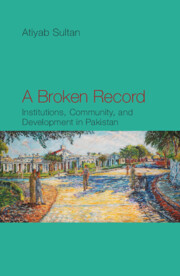Book contents
- Frontmatter
- Contents
- List of Figures
- List of Tables
- Preface
- Acknowledgements
- Introduction: Institutions, Debt, and the Deadweight of History, Punjab c. 1900–47
- 1 Glass Half Full?: Two Views of the Punjab
- 2 An Alternative Economic History of the Punjab
- 3 Combating Indebtedness I: Laws and Institutions
- 4 Combating Indebtedness II: Community Development in Colonial Punjab
- 5 The Bureaucrat’s Burden: Tales of Reform and Development
- 6 Colonialism and the Discourse on Development
- Postscript
- Glossary
- Bibliography
- Index
1 - Glass Half Full?: Two Views of the Punjab
Published online by Cambridge University Press: 27 September 2022
- Frontmatter
- Contents
- List of Figures
- List of Tables
- Preface
- Acknowledgements
- Introduction: Institutions, Debt, and the Deadweight of History, Punjab c. 1900–47
- 1 Glass Half Full?: Two Views of the Punjab
- 2 An Alternative Economic History of the Punjab
- 3 Combating Indebtedness I: Laws and Institutions
- 4 Combating Indebtedness II: Community Development in Colonial Punjab
- 5 The Bureaucrat’s Burden: Tales of Reform and Development
- 6 Colonialism and the Discourse on Development
- Postscript
- Glossary
- Bibliography
- Index
Summary
Colonialism hardly ever exploits the whole of a country. It contents itself with bringing to light the natural resources, which it extracts, and exports to meet the needs of the mother country's industries, thereby allowing certain sectors of the colony to become relatively rich. But the rest of the colony follows its path of under-development and poverty, or at all events sinks into it more deeply.
—Frantz Fanon, The Wretched of the EarthHis speech is mortgaged bedding,
On his kine he borrows yet
At his heart is his daughter's wedding
In his eye foreknowledge of debt.
He eats and hath indigestion
He toils and may not stop
His life is a long-drawn question
Between a crop and a crop
—Rudyard Kipling, The Masque of PlentyRobert Tawney famously described the vulnerable state of the Chinese peasantry in the early twentieth century as follows: ‘There are districts in which the position of the rural population is that of a man standing permanently up to the neck in water, so that even a ripple is sufficient to drown him.’ James Scott later used this description to draw an evocative account of peasant rebellion in Southeast Asia in his seminal The Moral Economy of the Peasant. Scott discussed the destruction of what he termed as the ‘moral economy’, the worldview and practices of the peasants premised on the subsistence ethic, due to colonialism. Scott's description of the Vietnamese peasantry was in contrast to Samuel Popkin's account of the Southeast Asian peasant in The Rational Peasant. Popkin stressed that peasants behaved rationally and benefited from market practices that were ushered in with colonialism. The test of time has seen Scott's scholarship remain a more convincing account of how peasant societies experience colonialism with Popkin's explanation marginalized. This may well hold for Vietnam where the pernicious effects of colonialism were more pronounced, leading to numerous peasant rebellions and famine, but for the Punjab the academic discourse remains deeply divided.
- Type
- Chapter
- Information
- A Broken RecordInstitutions, Community and Development in Pakistan, pp. 7 - 28Publisher: Cambridge University PressPrint publication year: 2022



